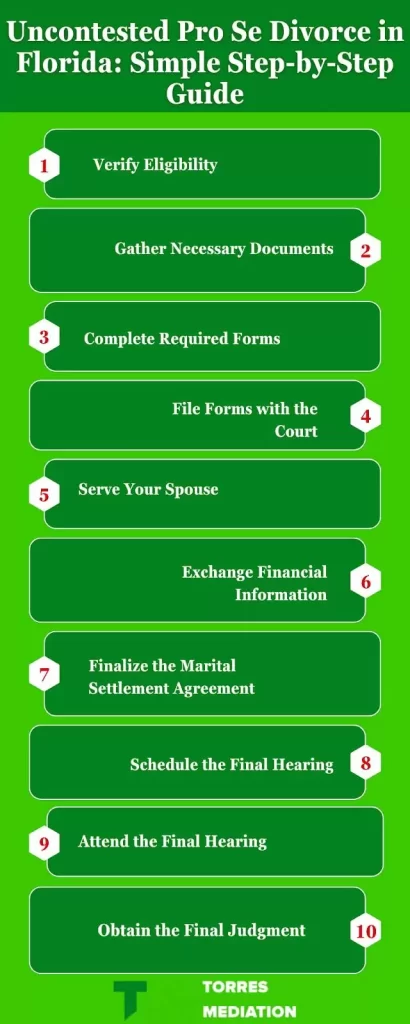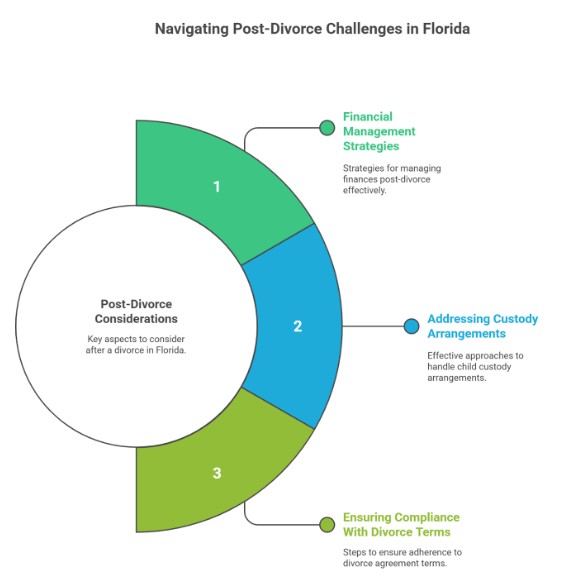Call Now For Service!
Originally published: December 2024 | Updated: October 2025 | Reviewed by Kim Torres

An uncontested pro se divorce means that both spouses agree to all key issues (assets, custody, and support) and handle the legal process themselves without the assistance of attorneys.
In Florida, this option is faster, less expensive, and requires following strict procedural steps to ensure validity.
Filing for a pro se divorce in Florida involves several steps, including checking eligibility, gathering necessary forms, and attending hearings.
Many couples choose an uncontested pro se divorce when they already agree on key issues like property division, child custody, and support. This path is typically faster and less expensive than traditional divorce litigation, but it requires strict adherence to Florida’s rules and forms.
Pro se divorce may not be the right choice for everyone. Complex financial cases, parenting disputes, or disagreements about assets often need legal representation.
For couples who can cooperate and communicate effectively, though, it offers a streamlined solution.

To file uncontested in Florida, at least one spouse must meet the state’s 6-month residency requirement, and both must fully agree on property division, alimony, child custody, child support, and other financial matters. Without agreement, the divorce is contested.
Florida law requires at least one spouse to live in the state for 6 months before filing for divorce. This residency requirement applies to all divorces, including those that are uncontested.
Proof of residency can be shown with:
If neither spouse meets this requirement, they cannot file for divorce in the state of Florida. They must wait until one has lived in the state long enough.
For an uncontested divorce, spouses must agree on all major issues. This includes:
If couples disagree on any of these points, their divorce is considered a contested one. They may need to resolve disputes through mediation or court hearings.
In uncontested cases, spouses create a written agreement that outlines how they’ll handle property, finances, and children after divorce.
Florida is a no-fault divorce state. This means couples don’t need to prove wrongdoing to end their marriage. They only need to state their marriage is “irretrievably broken.”
Uncontested divorces work best when:
Some couples may qualify for a simplified dissolution of marriage, which is faster for those without children or property disputes.
Uncontested divorces are typically quicker and less expensive than contested ones. They often don’t require court appearances, making the process less stressful for all involved.

Preparing for an uncontested pro se divorce in Florida involves gathering mandatory financial documents, completing state-specific forms, and ensuring that both spouses fully agree on property division, custody, and support.
Careful preparation prevents court rejections and ensures a fast, affordable, and legally sound process.
Before filing, collect these essentials:
Tip: Make at least two copies of every document to speed up court processing and avoid delays during disclosure.
Florida requires specific forms for uncontested pro se divorces:
Where to get them:
Always read the instructions carefully. Do not sign until you’re in front of a notary, as most forms require notarization.
An uncontested divorce only works if you and your spouse agree on all terms, including:
Steps to confirm agreement:
Navigating an uncontested pro se divorce in Florida can feel overwhelming, but Torres Mediation Services is here to guide you. Our expert divorce mediation services streamline the process, saving you time and stress. Take the first step today!
If you’re ready to get started, call us now!

To start a divorce in Florida, you must file a Petition for Dissolution of Marriage at the circuit court in your county.
The process involves selecting the correct courthouse, paying the required filing fees, serving your spouse within the deadlines, and exchanging mandatory financial disclosures before the final judgment.
To file for divorce in Florida, choose the courthouse in the county where you or your spouse lives. This is typically the circuit court in your area.
If you’ve lived in Florida for at least 6 months, you can file a petition for dissolution of marriage. There are two main types:
Check your county court’s website for specific filing instructions. Some courts allow online submissions, while others require in-person filing.
The cost to file for divorce in Florida varies by county. Most charge around $400 for a dissolution of marriage petition. Additional fees may apply for:
Payment methods often include:
Ask the clerk about fee waivers if you are unable to afford the fees. You’ll need to prove financial hardship.
After filing the divorce petition, several important deadlines come into play:
The entire divorce process can take 3-4 months for uncontested cases. Contested divorces may take longer.
Florida courts require a 20-day waiting period after filing before a judge can finalize the divorce. This gives couples time to reconsider or work out any remaining issues.
Are you confused about Florida’s divorce forms or struggling with agreements? Torres Mediation Services streamlines uncontested divorces, enabling you and your spouse to reach resolutions efficiently. Contact us now to make your divorce journey smoother and more cost-effective!
If you’re ready to get started, call us now!
The final hearing in a Florida uncontested divorce is a short court appearance where you present your signed settlement agreement to a judge.
If everything is complete and uncontested, the judge approves the terms, signs the Final Judgment of Dissolution, and legally ends your marriage within minutes.
To schedule the final hearing, contact the judge’s office or follow your county’s specific procedures. Bring all required documents, including your marital settlement agreement and final judgment of dissolution of marriage.
Make copies of everything for the judge and your spouse. Dress neatly and arrive early to find the correct courtroom.
You should review your paperwork beforehand to feel prepared. If you have questions, ask the clerk or consult a lawyer.
When called, approach the judge’s bench. The judge will swear you in. Explain that you seek an uncontested divorce and have a signed marital settlement agreement.
Present the agreement to the judge. They may ask questions about its terms. Answer honestly and clearly. If both spouses are present, the judge might ask if you both understand and agree to the terms.
Be ready to explain how you divided assets, debts, and any child-related matters.
Most delays in Florida pro se divorces come from incomplete paperwork, missing signatures, and missed deadlines.
Double-checking forms, notarizing required documents, and staying ahead of filing timelines ensure your uncontested case moves quickly and avoids costly rejections by the court.

After a Florida divorce is finalized, spouses must update their financial accounts, adhere to the parenting plan, and comply with the terms of the settlement agreement.
Staying organized with custody schedules, child support, and ongoing obligations helps avoid disputes. Reviewing insurance, taxes, and beneficiary designations is essential for maintaining long-term financial security after divorce.
Proper financial planning is key after a divorce. Creating a new budget is essential. It should reflect changes in income and expenses. Some may need to adjust their lifestyle.
It is crucial to review and update financial accounts, including bank accounts, credit cards, and investments. It is also important to remove an ex-spouse’s name from joint accounts.
Keeping accurate records is vital for those paying or receiving alimony or child support. These payments can affect taxes, so consulting a tax professional may be helpful.
Rebuilding credit and saving for retirement are also important. If they were on their ex-spouse’s health insurance plan, some may need to find new coverage.
Child custody arrangements require ongoing effort. Clear communication with the ex-spouse is crucial. Using a shared calendar can help you manage schedules effectively.
Being flexible with visitation can benefit everyone. However, significant changes should be documented and approved by the court.
It is essential to prioritize the children’s needs. This may mean working with the other parent to establish consistent household rules.
Co-parenting classes or therapy can be helpful. These resources teach effective communication and conflict-resolution skills.
Both parties must follow the terms of the divorce agreement, which include property division, alimony, and child support payments.
It is important to keep detailed records of all financial transactions related to the divorce, including receipts for child-related expenses.
If one party fails to comply, the other may need to return to court to enforce the agreement. Filing a motion for contempt is an option if the terms are not followed.
If circumstances change significantly, the divorce agreement can be modified. This requires filing a petition with the court. Changes might involve custody, support payments, or alimony.
Ready to finalize your uncontested pro se divorce in Florida? Torres Mediation Services ensures a seamless and stress-free process with professional mediation tailored to your specific needs. Reach out today to get started and move forward confidently!
Who qualifies for an uncontested pro se divorce in Florida?
You qualify if you or your spouse has lived in Florida for at least six months and you both agree on all issues, including property division, custody, child support, and alimony. Without full agreement, the case becomes contested.
What forms are required to file for an uncontested divorce?
The main form is Petition for Dissolution of Marriage (Form 12.901(b)(1)). You’ll also need a Financial Affidavit, Notice of Social Security Number, and, if children are involved, a Parenting Plan and Child Support Guidelines Worksheet. All forms are available on the Florida Courts website.
How much does it cost to file for an uncontested divorce in Florida?
Filing fees average $400 to $450, depending on the county. Additional costs include serving your spouse, obtaining certified copies of documents, and changing your name. Fee waivers may be available if you can show financial hardship through an Application for Civil Indigent Status.
How long does an uncontested pro se divorce take in Florida?
Most uncontested divorces are finalized within three to four months, provided all paperwork is accurate and deadlines are met. Florida law requires a 20-day waiting period after filing before a judge can issue the Final Judgment of Dissolution.
Do I need to appear in court for an uncontested divorce?
Yes. Even in uncontested cases, at least one spouse must usually attend a brief final hearing. The judge will review your settlement agreement, ask questions, and then sign the Final Judgment if everything is in order.
What happens if my paperwork is incomplete or incorrect?
Incomplete or inaccurate forms are one of the most common reasons for delays. The clerk may reject your filing, or the judge may refuse to approve the agreement. Double-check names, financial details, and signatures, and ensure all notarizations are completed before submission.
Can an uncontested divorce still use mediation?
Yes. Even uncontested divorces benefit from mediation if small disagreements arise. A mediator helps spouses resolve issues quickly, ensuring the divorce remains uncontested and avoiding delays from court disputes. Mediation is also helpful in drafting clear and enforceable settlement terms.
What should I do after my uncontested divorce is finalized?
After the judge signs the Final Judgment, update financial accounts, insurance policies, and beneficiary designations. If children are involved, follow the approved parenting plan and child support orders. Keep a certified copy of the final judgment as proof of your divorce.